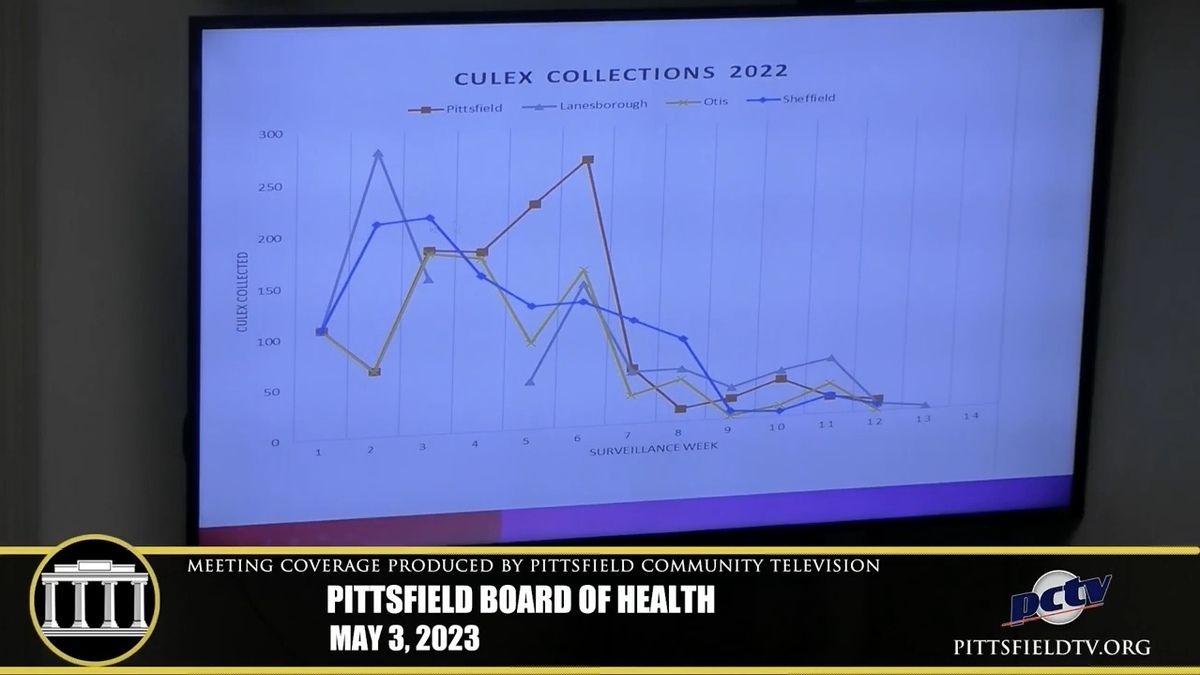Pittsfield Health Board Accepts Mosquito Control Plan Without SprayingBy Brittany Polito, iBerkshires Staff
06:11PM / Tuesday, May 09, 2023 | |
 A graph showing the incidence of Culex mosquitos in Pittsfield shown during last week's Board of Health meeting. A graph showing the incidence of Culex mosquitos in Pittsfield shown during last week's Board of Health meeting. |
PITTSFIELD, Mass. — There were again no isolations of West Nile virus or eastern equine encephalitis in Pittsfield last year.
The Board of Health last week accepted a plan from the Berkshire County Mosquito Control Project that includes minor changes but continues to exclude spraying.
Changes include mechanical source reduction and the addition of two products for larval and adult control: a multi-brood controlled release granule and Merus 3.0.
"If I have mosquito surveillance numbers that are above our threshold I will make a recommendation to the board," the project's Superintendent Chris Horton said in terms of spraying.
The board has been tasked with the oversight of mosquito control since 2012.
Integrated mosquito management is used to control the critters, which includes
-
community engagement
-
mapping, surveillance, thresholds
-
source reduction, larval control, adult control
-
monitoring efficacy and resistance
A total of 3,994 catch basins were treated with larvicide during last year's breeding season. BCMCP submitted 122 pols with no isolation for WNV or EEE though there was an isolation in Berkshire County.
There was a rise in Culex mosquitos that are known to carry West Nile in the sixth week of the season that started in June but the population remained non-detect.
"We were above threshold in the early part of the season, but we did not detect any virus," Horton reported.
"We're able to do larval control work, we treat woodland wetland habitat, generates these mosquitoes, we also treat catch basins which are a breeding source for Culex mosquitoes and we saw along with the dry conditions that were established in early June, the population basically collapsed here in mid-August and never recovered for the rest of the season."
In April 2021, the subcommittee on Public Health and Safety voted to opt out of the spraying portion of BCMCP followed by an approval by the City Council later that month. The Board of Health pushed back against the council's decision after an onslaught of the insects over the summer caused by heavy rainfall, asking the subcommittee to reconsider. Instead, the subcommittee voted to opt out of BCMCP as a whole.
Later that month, the City Council grappled with the idea and referred the matter to the Conservation Commission, the Health Department, and Commissioner of Public Services and Utilities Ricardo Morales. The city never opted out of the program as a whole, but the mosquito spraying portion was discontinued. Pre-emptive larval control and catch basin operations remained.
Even though the council has opted out of spraying, the state can still mandate mosquito spraying under circumstances such as an outbreak of triple E. Under MGL Chapter 252 Section 2-A, the State Board has the authority to spray once the Department of Public Health has determined that there's an elevated risk of larva virus for that year.
Horton spoke about the statewide efforts in mosquito control.
Last year, a state task force was established by the Legislature to study mosquito control called the titled Mosquito Control for the Twenty-First Century Task Force.
"They did have recommendations for re-evaluating the administration of mosquito control because it's not equally administered across the state," he explained.
"For instance, in the western part of the state it's very difficult for towns to join mosquito control and achieve comprehensive mosquito control because the funding mechanism that we use, there are three factors three main factors that go into the funding: there's population, land area, real estate values,"
"Basically, the eastern part of the state has a huge advantage in real estate values and population so the vast majority of resources go to the eastern part of the state so one of the recommendations is that they have a baseline service for every community in the state and a funding mechanism to go with to ensure so that would benefit us in the western part of the state."
BCMCP will also be bringing enhanced non-chemical source reduction methods such as mechanical brush control and ditch maintenance online at the end of this season.
"It's basically a more balanced approach, I think," Horton said, as the organization has been doing brush control and ditch cleaning by hand up until now.
This has allowed them to do more than 5,000 feet of ditch cleaning each year and is expected to increase with the new equipment.
|

